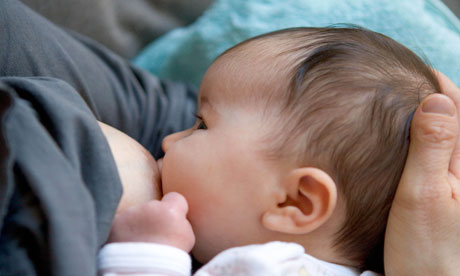
Encouraging disadvantaged mothers to breastfeed should be a key part of the government's plan for improving social mobility, according to leading academics and health experts.
Their demand comes as research into the effects of breastfeeding, to be presented at a conference in London this week, shows that it can boost children's IQ and health and reduces the chances of behavioural and weight problems.
The coalition's social mobility strategy aims to ensure "everyone has a fair opportunity to fulfil their potential, regardless of the circumstances of their birth". A commission established to oversee the strategy has devised a list of key indicators by which social mobility can be measured, enabling the government to see where intervention could make the most impact.
Researchers at the University of Essex's Institute of Social & Economic Research and the University of Oxford have spent the past two years looking at the impact of breastfeeding, excluding other factors such as social class, home environment and parents' education.
A policy document based on this research and other studies in the fields of epidemiology and public health, to be discussed at the conference hosted by the institute at the British Academy on Wednesday, says: "Aligning breastfeeding with social mobility may seem tenuous, but a body of recent research shows that an individual's behavioural and psycho-social outcomes have a significant impact on adult earnings and education. Differences in children's cognitive development emerge at early ages, and the importance of timely parental investments is increasingly recognised as a major factor in fostering child development.
"If research can demonstrate the extent to which positive outcomes are the result of breastfeeding, rather than arising from social factors, then there is a strong case for supporting and encouraging breastfeeding as an early intervention policy that can improve a child's life chances, particularly targeting young and disadvantaged mothers."
The research, which will be presented at the conference, shows there are many positive effects of breastfeeding: it reduces the likelihood of a child having behavioural problems at age five – 6% of full-term babies breastfed for four months have these issues compared with 16% of formula-fed babies; it increases the IQ of children breastfed for four weeks or more by around three points; it reduces the chances of a baby needing hospital treatment for diarrhoea or lower respiratory tract infections. Currently there is a large social gap in breastfeeding rates, with the most privileged mothers being several times more likely to breastfeed than the least privileged, according to the policy document.
Dr Emilia Del Bono, an economist at the ISER, said: "There seems to be evidence of benefits of breastfeeding in relation not just to health – which are already widely known – but also, and perhaps more controversially, in the cognitive, emotional and behavioural domains. There is a strong argument that the government should include breastfeeding on its list of social mobility indicators."
The social mobility and child poverty commission's list of indicators of success in improving social mobility for each life stage includes birth weight, results at key stage 2 , GCSE and A-level, and participation in education or training between the ages of 18 and 24.
Del Bono said: "There are quite a lot of established indicators on the list, for example performance at 'key stage 1 and 2', but few in terms of inequalities in health or health behaviours apart from birth weight.
"We know that health inequalities at the early stages translate into inequalities in terms of achievement later in life. If you want to talk about social mobility and early stages intervention, you have to look at the health side very closely."
However, the findings show that it could only be prolonged – more than four months – and exclusive breastfeeding that offers substantial benefits in the health and cognitive and behavioural development of a child.
Although millions have been spent on the promotion of breastfeeding in the past decade, Britain has one of the world's lowest rates of breastfeeding, with 35% of babies exclusively breastfed at one week old, 21% at six weeks, 7% at four months and 3% at six months. There has been much debate about the fact that some mothers who find it difficult to breastfeed are made to feel guilty for bottle-feeding.
Del Bono's research has found that mothers who receive good post-natal support in hospitals, following Unicef's "baby-friendly initiative" are 14.6% more likely to breastfeed and 6.6% more likely to continue to breastfeed exclusively four weeks after the birth. These effects are stronger for less educated and more economically disadvantaged mothers.
Del Bono added: "We need to see initiatives to support mothers not just to start breastfeeding, but to continue beyond the early days and weeks. Some policies that have been put in place, for example the promotion of breastfeeding in hospital, are good at encouraging mothers to breastfeed in the short term. But, in the long term, mothers need support and encouragement."
"It's clear already that breastfeeding provides more benefits the longer you do it. But in fact, we know very little about the effects of breastfeeding at long durations, because so few women breastfeed for more than a few weeks. It's only when more women start breastfeeding for longer periods that we will have the data necessary to investigate these effects."
A senior Liberal Democrat source said: "We expect the social mobility and child poverty commission to report on the progress of the indicators and to tell us whether they are the right ones. The current list is a good start but it does not have to be the final word."

